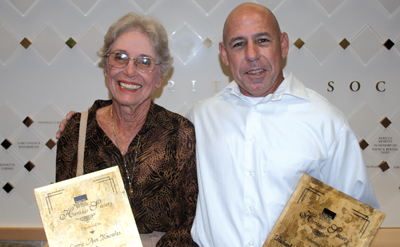How You Can Help
Gift Planning
Lorrie and Richard Knowles

DRI Foundation Founders Have a Reason to Believe in a Cure
Lorrie Ann Knowles has a reason to believe in a cure. Back in 1971 Lorrie and her late former husband Stanley Gurwitz were one of the five families who founded the Diabetes Research Institute Foundation. The Foundation's mission was to support a promising research program at the University of Miami solely aimed at curing those living with diabetes. That “promising research program" became the Diabetes Research Institute (DRI), the world leader in cure-focused research.
In the early days, the founding families of the DRI Foundation, all of whom had young children with diabetes, would meet for long and very emotional board meetings that often lasted until 2 a.m. The meetings were purpose-driven to develop creative ways to raise money, but they also provided support for the challenges they all faced as parents.
Lorrie’s son, Richard, was diagnosed with Type 1 diabetes at the age of 2.
“Richard had a very difficult time from the outset,” she recalls. “Many nights I would suddenly hear a distinctive noise coming from his bedroom, and I knew he was going into insulin shock. At that point it was vital to force him to eat or drink something in order to balance his blood sugar levels. I also remember that even after having a meal, he would have an insulin reaction when we went out to the grocery store. I was afraid to leave the house because it was so much harder to handle these incidents when we were outside. It was horrible.”
While these frightening experiences defined his childhood, Richard, now 46, said he always received encouragement from his parents and his doctor at the DRI, who was the founding scientific director of the Institute—Dr. Daniel Mintz.
“When I was 7 or 8 years old, my parents and Dr. Mintz kept telling me to take care of myself because eventually there was going to be a cure, and it was going to happen in my lifetime,” he said. “It was exciting, but it didn’t seem realistic. It just seemed like a dream.”
Despite his best efforts at self-management of the disease, Richard eventually developed many of the most severe complications of diabetes by the time he reached his twenties. He had hypoglycemic unawareness, diabetic neuropathy, and retinopathy, which required multiple laser surgeries in each eye.
“I realized at that point that I was really going in the wrong direction, and it was kind of scary,” he said. “The most serious problem for me was having hypoglycemic unawareness and being unable to sense a deep drop in my blood sugar. I remember having one incident when I lost consciousness while driving my car. I came to in a ditch, and a police officer was asking me questions that they would ask people suspected of driving under the influence. Eventually he realized that I had an insulin reaction and was just low in sugar.”
After 35 years of living with diabetes, Richard’s life changed forever. The DRI had become a pioneer in islet cell transplantation to restore natural insulin production, and because of the severity of his complications Richard was one of the first to qualify for a clinical-trial islet cell transplant.
“Since the transplant there’s been a huge difference in my life,” he said. “Thanks to the doctors at the Diabetes Research Institute and the DRI Foundation, I’ve been able to have the career that I always wanted—I became a firefighter. I wouldn’t have been able to do that without the transplant.”
Eight years after the transplant, Richard said he is still doing great.
“I’m no longer having any of the complications that I had before,” he said. “I don’t know if they are on hold—I know it’s not reversible. I do sense low blood sugar now, and even when it’s a little low, it’s still not as low as it used to be for me. I still have to test my blood sugar, but it’s different. I feel like a normal person sometimes.”
Until a universal biological cure to restore natural insulin production is found for the millions of children and adults living with diabetes, Richard and Lorrie said they intend to ensure that scientific advances will continue for future generations. They have both made provisions for the DRI Foundation in their estate planning. Lorrie has arranged to leave a bequest to the DRI Foundation, and Richard has named the Foundation a beneficiary of a life insurance policy.
“I wanted to make a bequest to the DRI Foundation in honor of the five founding families,” said Lorrie. “I asked that the funds be designated to support the islet cell transplant program, in gratitude for everything they did for Richard.”
Richard said he believes that one day a cure will be found at the DRI.
“It’s only going to get better with the technology and the great doctors that we have over here,” said Richard, who still must contend with a daily regimen of immunosuppressive drugs to prevent his body from rejecting the islet transplants. “It’s very exciting for me because I realize that everybody who started the DRI Foundation 40 years ago can see how far we’ve come. It’s so close now. There is a reason to believe in a cure.”
For more information on how you can help bring us closer to a universal cure with a bequest, gift of life insurance, and a variety of other planned gifts, please contact Jill Shapiro Miller, vice president of gift planning, at (800) 321-3437.
© Pentera, Inc. Planned giving content. All rights reserved.
Disclaimer

